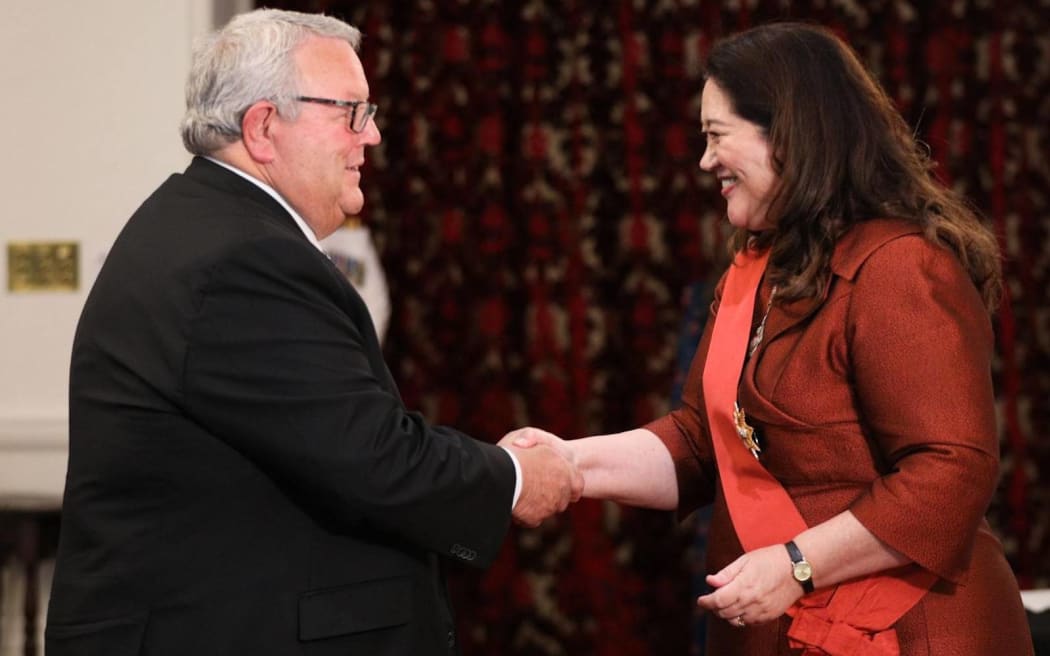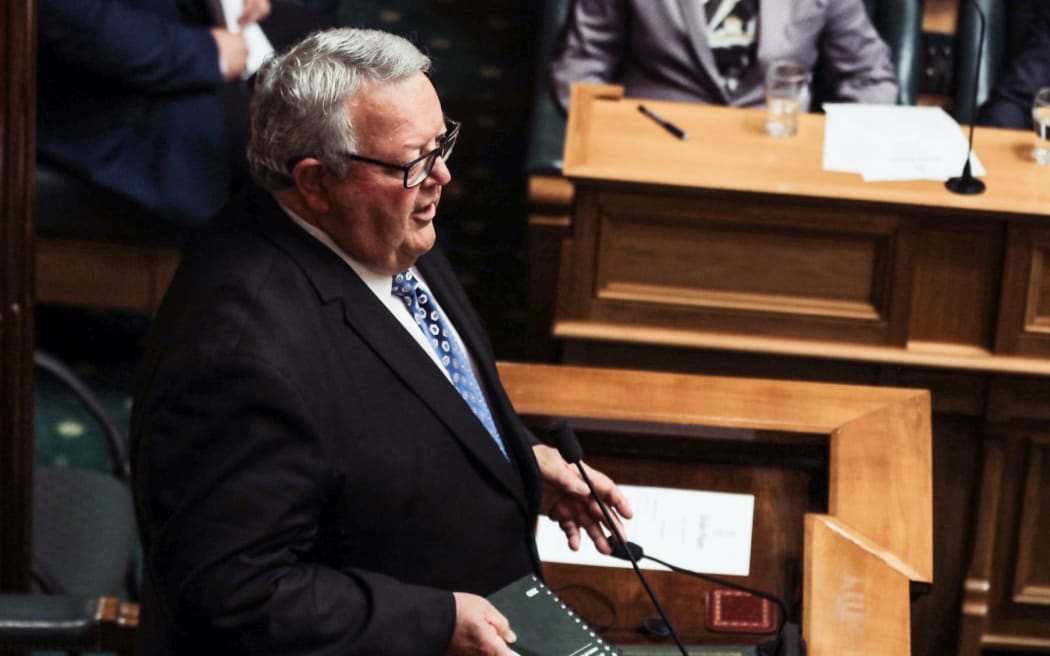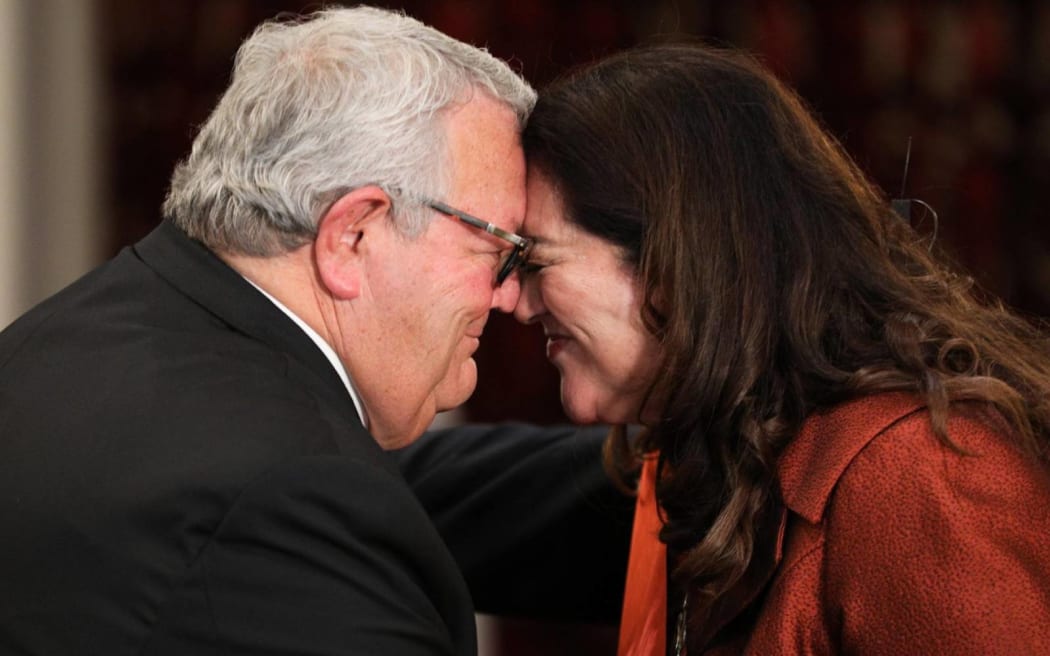
Gerry Brownlee is sworn in as Speaker by Governor-General Dame Cindy Kiro. Photo: Angus Dreaver / RNZ
As expected, National's Gerry Brownlee has been elected Speaker of the House, Parliament's referee and landlord.
"What a surprise," he said, on first moving to the speaker's chair after being elected by his fellow MPs.
The position is the highest officer elected by the House of Representatives, and is constitutionally the third most important role after the governor-general and the prime minister.
Brownlee takes over from Labour's Adrian Rurawhe, who returns to the opposition benches. In New Zealand, the speaker is typically a member of the main governing party with a majority of support from across Parliament required to be elected to the position.
Prime Minister Christopher Luxon, when announcing the coalition government's agreements, confirmed Brownlee would be selected by the three governing parties.
Brownlee also spoke to opposition parties in the lead-up to his selection, as predecessors typically had.
Te Pāti Māori nominated Rurawhe to the role, but Rurawhe declined. With no other nominations, Brownlee successfully won the role.
He said he saw the role very much as a protector of MPs' rights, to speak freely, and to go about their business across the country unimpeded.
"I want to acknowledge the seven speakers that I've served under in my time in the Parliament," Brownlee said. "Many of them at some point or another have come under some approbium from parts of the House, quite often from me. And I think that is unfortunately the lot of the speaker, but I'll do my best to be fair and even across the House."

Brownlee addresses MPs in the debating chamber at Parliament. Photo: RNZ / Samuel Rillstone
He paid special tribute to Rurawhe.
"You, Sir, brought a calm and a dignity to this House at a time that it was needed, and I know that many members who are here today very much appreciate that."
He then laid out how he planned his own approach to the job.
"Standing orders really are just a guide for how this house works. They're important and they give us a framework but they're not absolute," he said.
He spoke about sitting through the Address in Reply debate when he first came to Parliament in 1996, and then-speaker Sir Douglas Kidd advised him to learn through "simply osmosis: be here, learn from the environment, don't get too hung up on the rules, recognise that there's a free flow of debate and participate in it reasonably whenever you can - but above all learn".
He offered the same advice to all new MPs.
"Can I with those remarks, thank the House for their confidence, and express a wish that we all might get on a bit better than I got on with some of the speakers who've gone before me. I suppose in that regard I should probably acknowledge my biggest challenge will probably be keeping myself in order."
After he was voted in at Parliament on Tuesday morning, leaders from all the parties offered their congratulations - as is the usual practice.
National's Christopher Luxon thanked him for stepping up and serving "in this unique way", saying Brownlee was "paternal but not paternalistic, knowledgable but not a know-it-all".
Labour's Chris Hipkins pointed to the many roles Brownlee had undertaken, saying he a true Parliamentarian. He said Brownlee's experience with the Canterbury earthquakes marked him out well for the role because he was "familiar with holding a position in which no matter what decision you make someone is going to be upset".
Green MP Ricardo Menéndez March said the party acknowledged his experience and reiterated a commitment to work with him towards family inclusion, protection of staff, accessibility and honouring the duty of care members had to each other.
ACT's David Seymour urged Brownlee to uphold the Standing Orders, saying having led a party as its sole MP for two terms, the ability to appeal to the speaker to uphold those rules was sometimes "the only protection that this Parliament and ultimately our democracy has".
NZ First's leader Winston Peters spoke about the need to preserve New Zealand, saying he knew full well Brownlee could do the job, and had confidence in his ability to adjudicate with fairness.
Te Pāti Māori co-leader Rawiri Waititi offered congratulations, saying they had a good personal relationship.
"I hope to maintain that, Mr Speaker, because my first experience of a speaker here had me kicked out several times. The last speaker had me suspended. I'm look forward to seeing what you and I can achieve together, heading into the next three years."
Brownlee then thanked the members, saying "well I've listened to the advice, not necessarily taken it all on board, and I think that's a very good start ... my door will always be open to all members of Parliament".
He then adjourned Parliament before going to Government House to be officially sworn to the role by the governor-general.

Brownlee exchanges a hongi with Governor-General Dame Cindy Kiro on being officially sworn in. Photo: Angus Dreaver / RNZ


